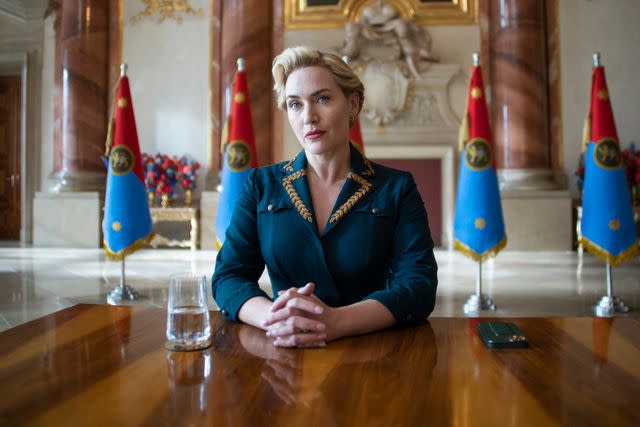“The Regime” creator calls it 'a fairytale' within the trappings of a satire of autocracy
"I like the idea of having this very researched and real geopolitical framework for the show, but within our little jewel box of a palace," Will Tracy tells EW. "It's a bit of a fairytale in there."
The Regime feels like a mash-up of Veep and The Great, but creator Will Tracy had another piece of source material in mind — fairytales.
Tracy, who was previously a writer on Succession, set out to write a satire of autocrats, while also telling a love story. "I was trying to write something that felt stylistically and tonally a bit different," he tells EW. "I like the idea of having this very researched and real geopolitical framework for the show, but within our little jewel box of a palace. It's a bit of a fairytale in there."
The series, which premieres Sunday on HBO at 9:00 p.m., follows Chancellor Elena Vernham (Kate Winslet), whose everyday schedule is disrupted when she brings in Corporal Herbert Zubak (Matthias Schoenaerts) to monitor the moisture levels in her home. But Elena finds an unlikely kindred spirit in Herbert, and soon, the two begin to reconsider what Elena's rule should look like.
"It's a love story between these two people who have this kind of dreamy vibe, even when they first see each other," adds Tracy. "It's a little bit like Sleeping Beauty. 'I know you. I walked with you once upon a dream.' I wanted to carry that somewhat stylized, dreamy, middle European fairy-tale tone throughout the show. I'm not sure if that relates to any other piece of pop culture, which probably made it a little bit harder to describe exactly what the show was."

Miya Mizuno/HBO
Kate Winslet on 'The Regime'Even with those fairy-tale trappings, The Regime is also a satirical look at governments ruled by grossly unqualified autocratic leaders. Tracy says he's held a lengthy fascination with the subject. "I've long been obsessed with reading about oppressive regimes and autocrats," he explains. "It's my comfort reading; God knows why. But one book that I had read was a book called The Emperor about the last days of the reign of Haile Selassie, the last Emperor of Ethiopia. It's told from the perspective of servants within the palace. It talks about the fall of his regime, but it also talks about what his day was like when he would wake up, what he would eat for breakfast, who dressed him, how he would dress, how he would behave in meetings. It wasn't a story, but I thought that would be a good [idea] for a show — a kind of upstairs/downstairs Downton Abbey-type show, only it's set within an autocrat's palace instead of an English country manor house."
However, Tracy didn't want to lean into more common tropes of an alternate, dystopian America or riff on Russia. Instead, he wanted something a bit more caught between two worlds. "I was interested in something that felt like betwixt east and west," he explains. "If you're right in the middle, you don't fall on either side, which makes you strategically very important in that region, especially if you have a big natural resource. I liked that idea of being a country with a leader who feels as though they're not really at the grown-ups table of the geopolitical back and forth, but caught between the hegemonic powers and the West. And a leader who craves the status of that in a dangerous, exciting way."
Tracy didn't write the role of Elena for Winslet. He says he would have been heartbroken if he had and she had passed. But once Stephen Frears was on board to direct, they approached Winslet, who was eager to see more. From there, Tracy hastily wrote a second episode for her to read and continued to flesh out and shape the character around her once she signed on.
"As she started to develop the character and the way she looked and sounded and behaved, then I'm writing towards that," he notes.
It was Winslet who brought Elena's distinctive lisp to the character, as well as much of her carefully cultivated image. "She really thought about how she would dress, what her hair would be like from scene to scene, from moment to moment, depending on who she's meeting with, who she's talking to, how she wants to be perceived, what message she wants to send," he adds. "So much of the character is wrapped up in the presentation and the image. Kate was quite brilliant preparing for all of that."
Sign up for Entertainment Weekly's free daily newsletter to get breaking TV news, exclusive first looks, recaps, reviews, interviews with your favorite stars, and more.
Related content:
Kate Winslet admits that post-Titanic fame was 'horrible': 'My life was quite unpleasant'
Kate Winslet hospitalized after suffering fall while shooting Lee movie
Read the original article on Entertainment Weekly.


